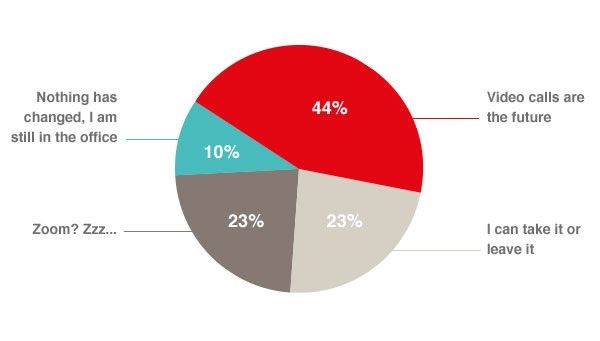Over the past 8 months, video calls have become part of all our daily work lives.
At Regus, we’re always interested in the well-being of our customers, so we decided to run a survey to find out how you’re feeling about all the time you’re spending online.
The results are now in:

How do you feel about video calls? Send feedback.
How to be a happier and healthier homeworker
With WFH becoming the norm for many professionals, there’s never been a better time to make the most of your new working environment. Regus’ new partner, HomeToWork, shares a few suggestions on where to start
When the pandemic is over, one in six workers is projected to continue working from home or coworking at least two days a week, according to a recent survey by economists at Harvard Business School. Another survey of hiring managers by global freelancing platform Upwork found that one-fifth of the workforce could be entirely remote after the pandemic.
Clearly, there’s never been a better time to start looking at ways to upgrade your homeworking experience to help you make the most of your ‘new normal’. And Spaces’s newest partner, HomeToWork, is here to help. As your one-stop support platform for smarter homeworking and a better work-life balance, it’s everything you need to make working from home a more engaging, social and productive experience.
1. Are you sitting comfortably?
Aching back? Stiff neck? Eye-strain or headaches? Your chair could be to blame. Invest in a proper office chair and your body will thank you. But which one to choose? The New York Times regularly asks ergonomic experts and panelists to select the best options, and the Steelcase Gesture has once again come out on top (a record it has held since 2015).
2. Personalise your space
One of the benefits of not being in a traditional office is that you can set up your workspace to look exactly how you want it. Choose the best physical set-up for your team, from the style of ergonomic chair, to options for break-out lounges, waiting rooms, storage walls and executive spaces. One thing you might want to add is plants. Numerous scientific studies have proven the positives of having more workspace greenery, which improves everything from the air quality to your stress levels.
3. Beat the productivity slump
How can you be more productive while working from home? One of our favourite tips is to create a productivity playlist. A study published in the Journal of Music Therapy found that listening to your favourite music lowers your perception of tension, making you happier and more productive during the workday. Trying to concentrate on something new? Research by Spotify suggests that classical music with 60-70 beats per minute is best because it induces a state of relaxation where the mind is calm but alert.
4. Be a cybersecurity hero
Earlier this year, the International Association of IT Managers highlighted the cybersecurity risks arising from homeworking, and it didn’t make for pleasant reading. If you want to protect yourself and the company you work for, it’s really important to make sure your software is up to date and that you’re following all the correct security processes – no matter how dull or time-consuming they may be.
5. Join a like-minded community
It’s been a hard year for many professionals working from home, especially for those who’ve also had to home-school their children, care for vulnerable family members or worry about redundancy. If you’re feeling isolated, remember you’re not alone. Spaces’ new partner, HomeToWork, provides useful free content to help professionals make the most of working from home. So, sign up today to join a community of your homeworking peers.
6. Engage your mind
It can be easy to feel as if you’re out of the loop on industry developments when you’re not in the office every day – with professional development also taking a backseat to more pressing duties. However, taking the time to seek out online learning opportunities is one of the best things you can do to help you feel connected to your professional community and feel positive about your growth as an individual. Some employers offer staff training opportunities, but there’s also a wealth of information available online.